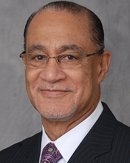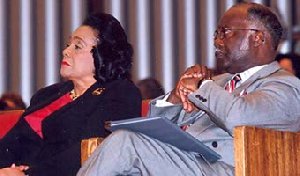ATLANTA (ABP)—Two men who have been in the fray a long time believe race relations have improved in the United States 150 years after the start of the Civil War—at least enough to justify encouragement.

Carroll Baltimore
|
Carroll Baltimore, president of the Progressive National Baptist Convention, grew up using second-hand books from the white school. He endured rock pelting when he walked to pick up the used books, in which students had written derogatory remarks, knowing who was going to get them. Later, he could not join his white soldier friends in a restaurant or movie theater.
Emmanuel McCall, for years charged with nurturing relationships between the predominantly white Southern Baptist Convention and the predominantly black members of National Baptist conventions, remembers “race relations” being a “dirty word” in the 1960s.
Since then, both he and Baltimore have observed “tremendous progress” in areas such as access to education, housing equality, job opportunities and opportunities to create personal wealth.
Baltimore believes racial divides continue because people won’t talk about race, even though there is an “undercurrent of race in most social issue discussions.” He was so concerned that he appointed a commission on race relations and cultural diversity within the PNBC.
“In some ways we’re ‘stuck’ because we don’t understand,” Baltimore said. “Because we don’t understand, we have deep cultural biases. … Race issues may be more cultural bias than anything else.”
John Mendez, chairman of the commission Baltimore appointed, chaired a similar commission for the National Council of Churches. Commissioners traveled to hot spots to intervene in racially tense situations, he said, lending their voice and support in public media. He has proposed the PNBC commission function similarly.
Mendez believes racism is pervasive. If people measure racism by the incidents of hate crimes committed by extremists, they too easily dismiss their own racism because they are “not like that.”

Emmanuel McCall, shown here with the late Coretta Scott King, was a prominent Southern Baptist denominational worker who was instrumental in addressing the denomination’s racial issues. (BP FILE PHOTO)
|
He believes “everyday racism” in the resegregating of schools, discrimination in jobs and housing is as bad today as ever. “I don’t buy into that argument that we are beyond racism, or that racism is only hate crimes,” he said.
Daniel Vestal, executive coordinator of the Cooperative Baptist Fellowship, said economics—the way the system treats poor people—might be the primary flash point around racial issues.
“There is something wrong with a country that accepts the great diversity between rich and poor. And there is something wrong with a government that encourages that,” Vestal said.
Speakers at a series of racial reconciliation conferences sponsored by the Cooperative Baptist Fellowship of North Carolina said simply being born white in America endows a person with privilege he or she likely never realizes, but white skin clears a path through life often blocked for persons of another color.
In economic recession, the issue of white privilege becomes more prominent, said Mendez, pastor of Emmanuel Baptist Church in Winston-Salem, N.C. “People feel like somebody is taking something away from them,” he said. “It’s pretty rough, pretty bad out there right now.
Election of a black president has polarized the nation around racial issues, rather than eased tensions, Baltimore feels. Many attribute controversy surrounding President Obama’s birth as an American to be nothing more than thinly veiled racial hostility, believing a black man could not have legitimately won the presidency.
Baltimore’s perception could be right if racial tensions are centered in fear and power, as many believe. Tension and fear arise when those in majority and its concomitant power see their numbers—and thus their power—falling into minority status.
During race relations conferences last year, McCall said underlying discussion was the fear of what’s going to happen when “they” outnumber “us.”
It is not just a black and white issue, as African-Americans feel threatened in job markets competing among Hispanics, Asians and African immigrants. McCall said in Atlanta, where he lives, Nigerian immigrants practically have taken over the taxi-cab driver market.
Integration actually came at the cost of community, Baltimore said, quoting an insight from Blowing the Trumpet in Open Court by Boykin Sanders. Black businesses lost customers when people could shop anywhere; black communities lost homeowners when banks no longer “red lined” suburban areas and black denominations lost churches when they were no longer the only option.
Baltimore sees bright spots in young people who “look through a different lens.” Like Baltimore, McCall sees “great hope” in young people. He teaches at Mercer University’s McAfee School of Theology and said his students laugh at issues their parents argued over.
McCall, 75, grew up where the biggest ethnic conflicts occurred between various European ethnic groups who lived in his Pennsylvania community.
He became embroiled in racial conflict as a student at the University of Louisville where, as the only black in the Baptist Student Union, local pastors asked BSU Director Fred Witty to exclude him. Witty refused, and students said they would “close the place down” if they were forced to exclude McCall.
Decades later, McCall sees formerly white churches in racially changing communities increasingly giving their property to black congregations who can minister in the community, rather than selling the property and giving proceeds to mission boards for ministry elsewhere.
It is “happening across the nation,” he said, which gives him cause for encouragement.
